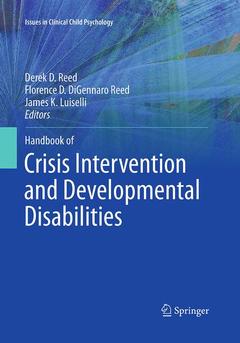Description
Handbook of Crisis Intervention and Developmental Disabilities, 2013
Issues in Clinical Child Psychology Series
Coordinators: Reed Derek D., DiGennaro Reed Florence D., Luiselli James K.
Language: English
Subjects for Handbook of Crisis Intervention and Developmental...:
Keywords
Comorbid psychiatric issues; Crisis intervention; Destructive behavior; Developmental disabilities; Evidence-based practices; Family involvement; Feeding disorders and units; Functional analysis; Home-based services; Inpatient units; Legal considerations; Outpatient units; Peer review; Policy and planning considerations; Prader-Willi Syndrome; Private school placement; Problem behaviors; Protective equipment; Protective holding; Psychopharmacology and self-injury; Residential services; School consultation; Staff training; Therapeutic restraint
Publication date: 08-2016
Support: Print on demand
Publication date: 04-2013
482 p. · 17.8x25.4 cm · Hardback
Description
/li>Contents
/li>Biography
/li>Comment
/li>
The Handbook of Crisis Intervention and Developmental Disabilities synthesizes a substantive range of evidence-based research on clinical treatments as well as organizational processes and policy. This comprehensive resource examines the concept of behavioral crisis in children and adults with special needs and provides a data-rich trove of research-into-practice findings. Emphasizing continuum-of-care options and evidence-based best practices, the volume examines crisis interventions across diverse treatment settings, including public and private schools, nonacademic residential settings as well as outpatient and home-based programs.
Key coverage includes:
- Assessment of problem behaviors.
- Co-occurring psychiatric disorders in individuals with intellectual disabilities.
- Family members? involvement in prevention and intervention.
- Intensive treatment in pediatric feeding disorders.
- Therapeutic restraint and protective holding.
- Effective evaluation of psychotropic drug effects.
The Handbook of Crisis Intervention and Developmental Disabilities is a must-have resource for researchers, scientist-practitioners, and graduate students in clinical child, school, developmental, and counseling psychology, clinical social work, behavior therapy/analysis, and special education as well as other related professionals working across a continuum of service deliverysettings.
1. Introduction.- Part I: Organizational Preparedness.- 2. Importance of Organizational Infrastructure.- 3. Peer Review.- 4. Evidence-Based Practice and Crisis Intervention.- 5. Empirically-Supported Staff Selection, Training, and Management Strategies.- 6. The Use of Protective Equipment in the Management of Severe Behavior Disorders.- 7. Therapeutic Restraint and Protective Holding.- Part II: Crisis Identification and Acknowledgement.- 8. Assessment of Problem Behavior.- 9. Functional Analysis of Problem Behavior.- 10. Assessment of Pediatric Feeding Disorders.- 11. Unique Considerations of Prader-Willi Syndrome.- 12. The Motivation for Self-Injury: Looking Backward to Move Forward.- 13. Co-occurring Psychiatric Disorders in Individuals with Intellectual Disability.- 14. Involving Family in the Prevention and Intervention of Behavior Problems in Individuals with Intellectual and Developmental Disabilities.- Part III: Navigating the Continuum of Care.- 15. Legal and Ethical Issues.- 16. Less to More Restrictive Settings: Policy and Planning Considerations.- 17. How to Make Effective Evaluation of Psychotropic Drug Effects in People with Developmental Disabilities and Self-injurious Behavior.- 18. Consultation in Public School Settings.- 19. Home-Based Services.- 20. Components of a Private School Program Serving Children and Adolescents with Severe Problem Behavior.- 21. Treating Severe Problem Behavior within Intensive Day-Treatment Programs.- 22. Intensive Treatment of Pediatric Feeding Disorders.- 23. Outpatient Units.- 24. Intensive Outpatient Services.- 25. Do Good, Take Data, Get a Life, and Make a Meaningful Difference in Providing Residential Services.
Derek D. Reed, Ph.D., BCBA-D, is a behavior analyst specializing in applied behavior analysis, behavioral economics, use-inspired basic research, quantitative analysis, and performance improvement. Currently, he is an Assistant Professor and Director of the Laboratory in Applied Behavioral Economics at the University of Kansas. Dr. Reed has served as an editorial board member of Journal of Applied Behavior Analysis, Behavior Analysis in Practice, The Psychological Record, and Journal of Early Intensive Behavioral Interventions. He also served as Editor for Volumes 1 and 2 of the Behavior Analysis Review (2007) and is presently the Co-Editor of the APA Division 25 (Behavior Analysis) Recorder newsletter.
Florence D. DiGennaro Reed, Ph.D., BCBA-D, is a behavior analyst specializing in applied behavior analysis, staff training in service delivery settings, and performance management. Currently, she is an Assistant Professor and Director of the Performance Management Laboratory at the University of Kansas. Dr. DiGennaro Reed has served as an editorial board member of Journal of Applied Behavior Analysis, Behavior Analysis in Practice, School Psychology Review, Journal of Behavioral Education, and Journal of Early Intensive Behavioral Interventions. She has also served as Associate Editor for Journal of Behavioral Education and is presently the Co-Editor of the APA Division 25 (Behavior Analysis) Recorder newsletter. She sits on the Board of Directors for the Association for Science in Autism Treatment and consults with nonprofit organizations that provide services to individuals with developmental disabilities.
<
James K. Luiselli, Ed.D., ABPP, BCBA-D, is a clinical psychologist who has published 10 books and more than 250 articles in professional journals. He also has edited special-topic issues of journals such as Behavior Modification, Child & Family Behav




